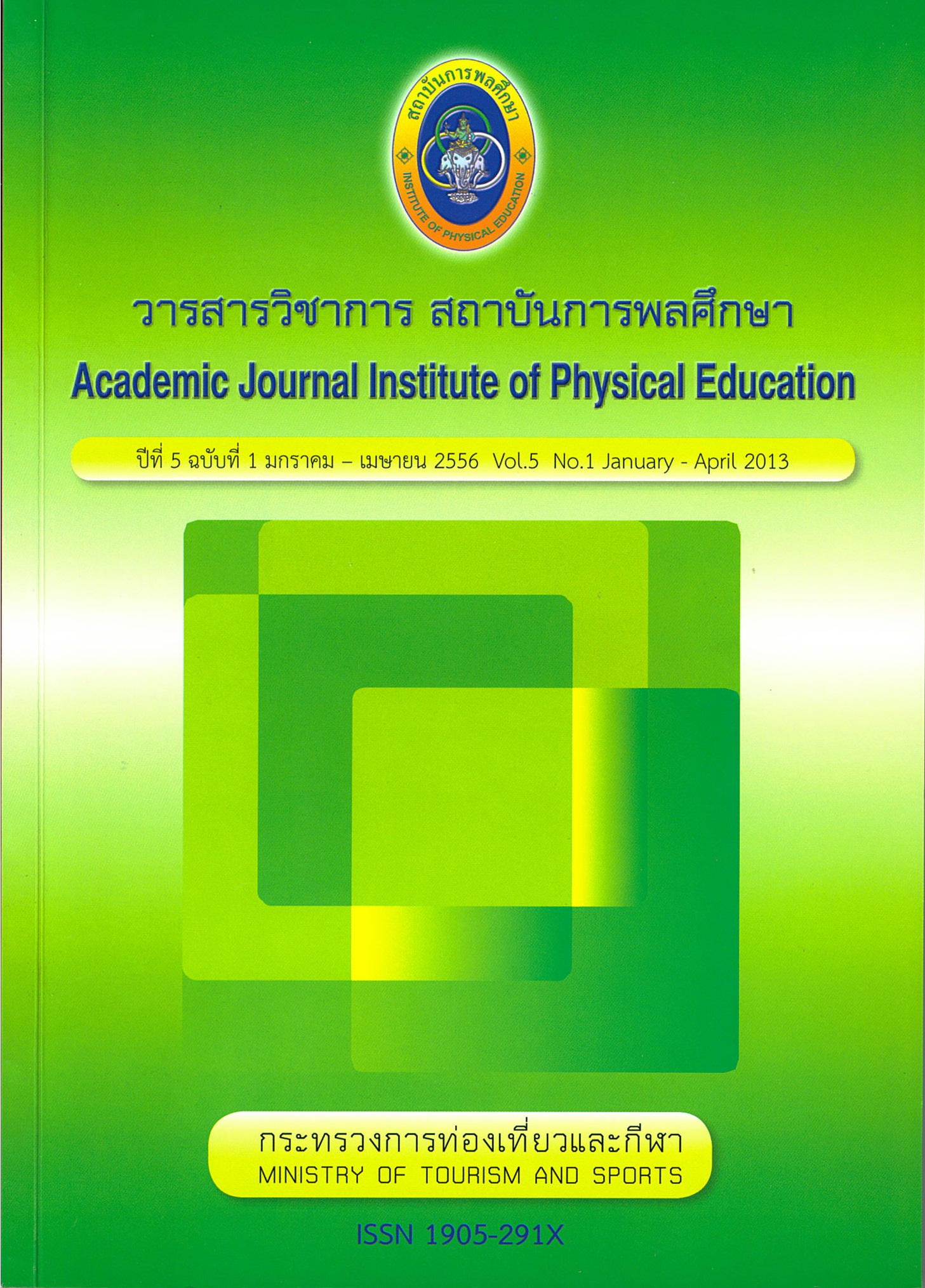A DEVELOPMENT OF TABLE TENNIS LEARNING EXPERIENCE SUPPLEMENTARY PROGRAM USING ELECTRONIC MEDIA FOR ENHANCING LEARNING OUTCOME OF UNDERGRADUATE STUDENTS
Main Article Content
Abstract
This study aimed to (1) design and develop table tennis learning experience supplementary program using electronic media, and (2) assess table tennis learning
experience supplementary program was used. The research methodology consisted of three steps: (1) creating and developing the research tools, (2) creating and evaluating the electronic media, and (3) using the research tools and evaluating their effectiveness.
In the current study, the electronic media were made available for students (1) to access and study independently anytime and anywhere both inside and outside the classroom, (2) to choose a lesson that suits their own needs and desires, and (3) to interact with their teacher and classmates through emails and social networking sites. The electronic media were comprised of 14 lessons. The lessons were delivered through Microsoft Word documents, Power Point plain texts, links to websites and web pages, VDO clips, news boards, message boards, homework assignments, questionnaires, tests, and glossaries. The results indicated that after participating in the learning experience supplementary program, the students in the experimental group achieved higher learning outcomes in all three domains than those in the control group. However, the experimental group demonstrated significantly higher learning outcome only in the affective domain (p<.05).
In conclusion, it found that the table tennis learning experience supplementary program using electronic media can enhance the students' learning outcomes in all three domains, but most effectively in the affective domain. This is probably due to interesting activities, incorporated in the electronic media, which address students' individual differences and needs
Article Details

This work is licensed under a Creative Commons Attribution-NonCommercial-NoDerivatives 4.0 International License.
The published article is a copyright of the Academic Journal of Thailand National Sports University. The passage appeared in each article in this academic journal is a perspective of each author which is not related to the journal. Each author is required to be responsible for all components of his/her own article. If there are any mistakes, each author must be responsible for those mistakes on his/her own.
References
ใจทิพย์ ณ สงขลา วิธีวิทยาการออกแบบการเรียนการสอนอิเล็กทรอนิกส์, กรุงเทพมหานคร: สํานักพิมพ์แห่งจุฬาลงกรณ์มหาวิทยาลัย, 2550.
เยาวดี วิบูลย์ศรี. การวัดผลและการสร้างแบบสอบผลสัมฤทธิ์, กรุงเทพมหานคร: สํานักพิมพ์แห่งจุฬาลงกรณ์มหาวิทยาลัย, 2549.
วชิราพร อัจฉริยโกศล, การประเมินผลสื่อการเรียนการสอน วารสารครุศาสตร์ 36 (ม.ค.- มี.ค.): 13-31.
วรศักดิ์ เพียรชอบ. รวมบทความเกี่ยวกับ ปรัชญา หลักการวิธีการสอนและการวัดประเมินผลทางพลศึกษา กรุงเทพมหานคร: สํานักพิมพ์แห่งจุฬาลงกรณ์มหาวิทยาลัย, 2548.
วิกิพีเดีย สารานุกรมเสรี. ทฤษฎีการเรียนรู้. [ออนไลน์].2551.แหล่งที่มา: http://th.wikipedia.org [25 มกราคม 2551]
พระราชบัญญัติการศึกษาแห่งชาติพ.ศ. 2542. [ออนไลน์].2550 แหล่งที่มา: http://www.tamanoon.com/eduact [19 สิงหาคม 2551].
สมโภชน์ เอี่ยมสุภาษิต. ทฤษฎีและเทคนิคการปรับพฤติกรรม. กรุงเทพมหานคร: สํานักพิมพ์แห่งจุฬาลงกรณ์มหาวิทยาลัย, 2550.
แสงอรุณ ประสพกาญจน์, ผลของการฝึกการตั้งเป้าหมายเชิงสร้างสรรค์ที่มีต่อการพัฒนาความคิดสร้างสรรค์ของนักเรียนชั้นมัธยมศึกษาปีที่ 3. วิทยานิพนธ์ปริญญามหาบัณฑิต ภาควิชาจิตวิทยา คณะครุศาสตร์ จุฬาลงกรณ์มหาวิทยาลัย, 2542
สุนทร นิศากร และ บุญเลิศ อรุณพิบูลย์. : E-learning[Online]. NECTEC' Web Based Learning [ออนไลน์]. 2550 แหล่งที่มา: http://www.nectec.or.th/courseware/cai/0018.html 2545 [3 กุมภาพันธ์ พ.ศ.2550]
สุมาลี ชัยเจริญ. การพัฒนารูปแบบการสร้างความรู้โดยใช้เทคโนโลยีสารสนเทศ การประชุมวิชาการการวิจัยเกี่ยวกับการปฏิรูปการเรียนรู้ 19-20 กรกฎาคม 2547. พิมพ์ครั้งที่ 2. กรุงเทพมหานคร : เจริญผล, 2548.
Baron, K. “Teaching Strategies that Promote Self-Regulated Learning in the Online. 2007. Environment". Journal of Instruction Delivery Systems. 21,2 (Spring2007): 13-16.
Dale, E. Audiovisual Methods in Teaching, third edition. NY: The Dryden Press; Holt, Rinehart and Winston. 1969.
Elisabeth. H. and Lauren. S. 2007. "Incorporating Video Games Into Physical Education”. JOPERD: The Journal of Physical Education, Recreation & Dance. 78,3 (Mar2007) :18-24.
Lim, W. and Michael, K. 2006. "Effectiveness of Learning Technologies in the Teaching and Learning of Gymnastics”. Pacific-Asian Education Journal, 18,2 (2006):69-77.
Marios, G. and Irini, D. 2006. "The Effectiveness of Teaching a Life Skills Program in a Physical Education Context”. European Journal of Psychology of Education, 21,4 (Dec 2006) : 429-438
Papert, S. Mindstorms: Children, Computers, and Powerful Ideas, Basic Books, Harper Collins Publishers, Inc., New York, 2nd ed., 1993.
Papert, S. The Connected Family, Atlanta, Georgia: Longsteet Press, 1996.
Resnick, M., Berg, R. & Eisenberg, M. “Beyond Black Boxed: Bringing Transparency and Aesthetics Back to Scientific Investigation”. Journal of the Learning Sciences, 2000.

